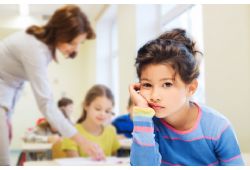We don’t have to be teachers to think back
and remember a time when a fellow schoolmate of ours was suspended. We might
have even joked, “I’m sure that Robert is just going to play video games all
day!”
Of course, our goal is not to shun a
student for misconduct and we are all trying our best. However, out-of-school
suspension (OSS) is shown to create a deficit in student learning, negatively
impacting success later in life. Also, no lessons or replacement skills are
acquired by students through or after OSS to prevent future misconduct.
In a 2011 report, The Council of State
Governments showed that a single OSS or expulsion doubles the likelihood of repeating
a grade. In addition, in a 2006 review, the American Psychological Association explains
that OSS is tied to behavioral problems, detachment from social interaction
with peers and adults, and high dropout rates.
Fortunately, there are more positive and
effective alternatives to OSS.
Some are now using restorative practices
so that students are given the chance to learn from their misconduct and reconcile
with the victim (if applicable). This approach can promote greater empathetic
growth, help students to be more understanding of one another, and build a
stronger family-like community within the school.
Although this method could work, it can be
a tad optimistic or idealistic. Say a meeting is held after an incident of
bullying. The victim, for example, might feel intimidated, leading him to leave
out part of the story or might be embarrassed to express certain feelings in
front of the student who teased or hurt him in the first place. This can negate
the purpose of the entire meeting since feelings are not completely shared and
issues are, therefore, not being completely rectified.
Another alternative, in-school suspension (ISS),
also does not have the same impact as OSS since students are kept in school, keeping
up with their schoolwork; meanwhile, administrators, teachers, and counselors
can find the source of this student’s problem.
On the other hand, there must always be a
teacher or staff member monitoring this student or students, adding more stress
to an already busy job. Since this is not daycare,
the responsible person or persons must monitor and talk to the student if a
real lesson is to be learned and real change is to be achieved.
As teachers, our actions taken in
difficult situations are in the best interest of our students as we are constantly
striving to create a safe environment where our students can learn and grow. Thus,
providing students suffering from emotional, behavioural, or social problems the
opportunity to learn from their mistakes and mend their relationships is key if
we wish for their behaviour to improve.
There are always challenges in every
situation and sometimes things are easier said than done. All the same, this might
be exactly the change required of us if we wish for these students’ grades and
behaviour to improve and dropout rates to decline.
Difficult roads can lead to better destinations.

 In The Latest Issue:Latest Issue:
In The Latest Issue:Latest Issue:
- A Bittersweet Farewell
- The new Laval Aquatic Co...
- The End of an Era:
Articles
Calendar
Virtual- ANNUAL TEACHER APPRECIATION CONTEST
- APPUI LAVAL
- ARTS & CULTURE
- CAMPS
- CAR GUIDE
- CCIL
- CENTENNIAL ACADEMY
- CHARITY FUNDRAISING
- CITYTV
- COSMODÔME
- COMMUNITY CONNECTIONS
- COVER STORY
- DINA DIMITRATOS
- ÉCOLE SUPÉRIEURE DE BALLET DU QUÉBEC
- EDITORIALS
- ÉDUCALOI
- EDUCATION
- EMPLOYMENT & ENTREPRENEURSHIP
- FÊTE DE LA FAMILLE
- FÊTE DU QUARTIER SAINT-BRUNO
- FAMILIES
- FESTIVAL LAVAL LAUGHS
- FÊTE DE QUARTIER VAL-DES-BRISES
- FINANCES
- GLI CUMBARE
- GROUPE RENO-EXPERT
- HEALTH & WELL-BEING
- 30 MINUTE HIT
- ANXIETY
- CHILDREN`S HEALTH & WELLNESS
- CLOSE AID
- DENTAL WELLNESS
- EXTREME EVOLUTION SPORTS CENTRE
- FONDATION CITÉ DE LA SANTÉ
- GENERAL
- HEARING HEALTH
- MESSAGES FROM THE HEALTH AGENCY OF CANADA
- MENTAL HEALTH
- SEXUALITY
- SOCIAL INTEGRATION
- SPECIAL NEEDS
- TEENS
- THE NUTRITION CORNER
- THE NUTRITION CORNER - RECIPES
- VACATION DESTINATION
- WOMEN'S FITNESS
- WOMEN'S HEALTH
- HILTON MONTREAL/LAVAL
- HOME & GARDEN
- INTERNATIONAL WOMEN'S DAY
- JAGUAR LAVAL
- LAVAL À VÉLO
- LAVAL FAMILIES TV SHOW
- LAVAL FAMILIES MAGAZINE CARES
- LAVAL URBAN IN NATURE
- LE PARCOURS DES HÉROS
- LES PETITS GOURMETS DANS MA COUR
- LEON'S FURNITURE
- LEONARDO DA VINCI CENTRE
- LFM PREMIERES
- LIFE BALANCE
- M.P. PROFILE
- MISS EDGAR'S AND MISS CRAMP'S SCHOOL
- MISSING CHILDREN'S NETWORK
- NETFOLIE
- NORTH STAR ACADEMY LAVAL
- OUTFRONT MEDIA
- PASSION SOCCER
- PARC DE LA RIVIÈRE-DES-MILLE-ÎLES
- PÂTISSERIE ST-MARTIN
- PIZZERIA LÌOLÀ
- PLACE BELL
- PORTRAITS OF YOUR MNA'S
- ROCKET DE LAVAL
- SACRED HEART SCHOOL
- SCOTIA BANK
- SHERATON LAVAL HOTEL
- SOCIÉTÉ ALZHEIMER LAVAL
- STATION 55
- STL
- SUBARU DE LAVAL
- TECHNOLOGY
- TEDXLAVAL
- TODAY`S LAURENTIANS AND LANAUDIÈRE
- TODAY`S LAVAL
- WARNER MUSIC
- THIS ISSUE
- MOST RECENT
Magazine
Suspensions: Are We Missing the Teachable Moment?
Articles ~e 105,7 Rythme FM 4 chemins Annual Teacher Appreciation Contest Appui Laval Arts & Culture Ballet Eddy Toussaint Camps THIS ISSUE MORE...
CONTESTS Enter our contests
CONTESTS Enter our contests
CALENDAR
Events & Activities
COMMUNITY Posts Events
PUBLICATIONS Our Magazine Family Resource Directory
LFM BUSINESS NETWORK Learn more
COUPONS Click to save!
COMMUNITY Posts Events
PUBLICATIONS Our Magazine Family Resource Directory
LFM BUSINESS NETWORK Learn more
COUPONS Click to save!
SUBSCRIPTIONS
Subscribe to the magazine
Un-Subscribe
E-NEWSLETTER Subscribe to our E-newsletter Un-Subscribe
WRITE FOR US Guidelines & Submissions
POLLS Vote today!
E-NEWSLETTER Subscribe to our E-newsletter Un-Subscribe
WRITE FOR US Guidelines & Submissions
POLLS Vote today!
ADVERTISERS
How to & Media guide
Pay your LFM invoice
SUGGESTIONS Reader's Survey Suggest a Listing
LFM About Us Our Mission Giving Back Contact Us
SUGGESTIONS Reader's Survey Suggest a Listing
LFM About Us Our Mission Giving Back Contact Us
 PICK-UP LOCATIONS
Get a copy of LFM!
PICK-UP LOCATIONS
Get a copy of LFM!
TERMS & CONDITIONS Privacy | Terms
ISSN (ONLINE) 2291-1677
ISSN (PRINT) 2291-1677
Website by ZENxDESIGN



 BY:
BY: 
Tweet
Share